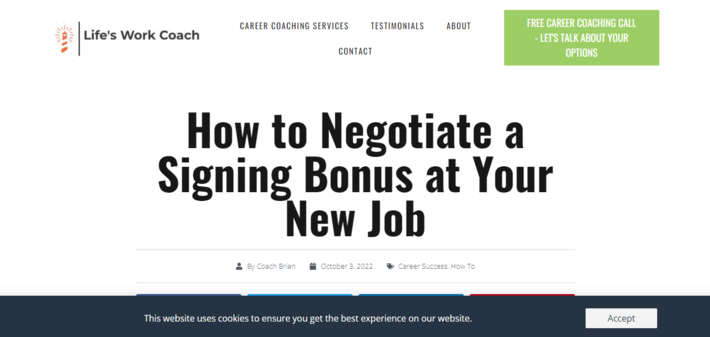
negotiate a signing bonus at Your New Job When you’re offered a new job, it’s normal to feel ecstatic After all, you’ve worked hard to get to this point in your career and you deserve it But before you sign on the dotted line, there’s one more important thing to consider your signing bonus.
Negotiate a Signing Bonus at Your New Job:
When you’re offered a new job, it’s normal to feel ecstatic. After all, you’ve worked hard to get to this point in your career and you deserve it. But before you sign on the dotted line, there’s one more important thing to consider: your signing bonus.
A signing bonus (or sign on bonus) is a lump sum of money that is paid to you when you start your new job. It is typically used as a way to entice top talent to join a company. If you’re lucky enough to be in a position to negotiate a signing bonus, there are a few things you should keep in mind.
THE EMPLOYER PERSPECTIVE:
There are a number of reasons employers will extend a pre-hire bonus, sometimes called a signing bonus or sign-on bonus.
In a competitive market employers may use a signing bonus to attract new talent.
A signing bonus is a great way to compensate a new hire for benefits or commissions that the new employee is walking away from. HIring sales people mid-quarter or executives mid-year can often be made easier with a signing bonus.
A one-time signing bonus can meet the candidate’s salary expectations for year-one. In this case it incentivises the new hire to perform well to make up the difference in year two by achieving bonus potential or getting an increase.
A sign-on bonus can be an incentive for a new employee to stay with a company for a certain period of time after accepting the position. In most cases there is a one-year period in which they are required to pay back the bonus should they leave the company.
WAIT TILL YOU GET THE OFFER:
This may sound like common sense but…
Don’t ask for your bonus before you get an offer letter. It is hard to negotiate without the offer and it could hurt your chances (or the employer could bake it into the offer.)You’ll be in a better position to know what to negotiate for once the offer is clear; base, benefits, insurance, vacation time, bonus potential, etc…
DO YOUR RESEARCH:
Before you even start negotiations, it’s important that you do your research. Knowing what the going rate is for your position will give you a good starting point for negotiations. You can use salary databases like Glassdoor or PayScale to get an idea of what other people in your position are making.
KNOW YOUR WORTH:
In addition to knowing the going rate for your position, you should also have a good understanding of your own worth. Think about the skills and experience that you bring to the table and how they will benefit the company. This will help you confidently negotiate for the salary and benefits that you deserve.

0 Comments